40 Queer Folks and Allies Share Their Memories From Pride Toronto’s First 40 Years
Four decades in, Pride Toronto remains an important site of activism and queer celebration.
Toronto Pride 2021 marks 40 years since Toronto’s first Gay Pride Week. Over four decades, what started as a series of small marches and picnics has turned into a behemoth festival that spans an entire month. In 2019, 1.9 million people attended Pride Month events during the organization’s last non-digital festival.
Always a mix of protest and celebration, queers who took part in the early years of Toronto Pride had a lot to rally against. Tim McCaskell, the granddaddy of Canadian gay activism, recounts in Any Other Way: How Toronto Got Queer how early Pride events acted as protests against police harassment, lies about homosexuality in the media and the Ontario Human Rights Code’s failure to protect lesbians and gay men.
Over the years, the politics of Pride in Toronto have shifted both as gay rights have progressed and as Pride Toronto has embraced corporatization. There are still powerful political moments, like when Black Lives Matter stopped the parade with a series of demands in 2016, but Pride today is more commonly associated with dance parties than, say, fighting back against the Toronto Police’s documented bias against queer people.
When FASHION reached out to people to share memories from Pride, what they shared demonstrated that Pride remains political, though often on a personal rather than a collective level. Many, for example, shared stories about taking up space for racialized and othered communities at Pride. Other simply shared their queer joy, which is itself a revolution in a heteronormative world.
As these memories attest, Pride doesn’t belong to the organizers who put the festival on, nor to the sponsors who foot the bill. At its core Pride isn’t even a festival. It’s an idea: queer liberation. Equity for every queer person, whatever their additional intersections may be. Pride is for the people.
Courtnay McFarlane, visual artist, poet and archival activist

“I attended my first Pride celebration in 1984 when I was still in high school, so I have many images and memories of Pride over the decades, but this image is among my favourites. It depicts the core members of the collective Blackness Yes! in 1999 who organized the very first Blockorama — the diasporic LGBTQ African, Caribbean and Black stage at Pride showcasing our history, creativity, resistance and joy. In that first year we had no stage, lights or change rooms, only a tent, a sound system and the southernmost sliver of the parking lot across from Wellesley street subway. I tie-dyed this fabric to cordon off a makeshift change room for the drag performers. However, the crowds came and fashioned an amphitheatre out of asphalt and planter boxes, the DJs created a sonic communal dance floor and drag diva Duchess reigned supreme. This Pride Blockorama celebrates its 23rd year.”
Amy Gottlieb, activist, artist and educator
“1981. A year of resistance. Chanting and marching in the streets. Angry. Joyous. Loving. In February, at midnight on Yonge Street, we roared ‘No More Shit.’ Toronto queers were pissed at the police raids of bathhouses, the brutality and arrests. In June, we yelled at the cops at 52 division, ‘Fuck You 52!’ after leaving our spirited Lesbian and Gay Pride Day rally at Grange Park. In October, Lesbians Against the Right led over 300 proud lesbians in a march down Bay Street, chanting ‘Look over here, look over there. Lesbians are everywhere!’ 1981 was about queers taking up space and resisting police repression alongside Black, Brown and Indigenous communities.”
Kristyn Wong-Tam, Toronto city councillor for Ward 13, Toronto Centre
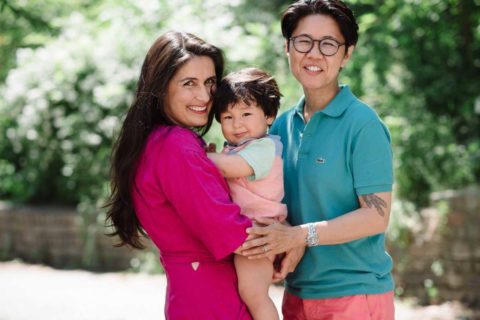
“In 1987, I marched in my first Pride parade — alongside professionals, unionists, drag queens, leather daddies, muscle Marys, twinks, grizzly bears, handsome butches, high femmes, trans folk and just about everyone else who stands on the outside looking in. Years later, I never imagined that the experience of political liberation fostered by my participation in that Pride parade would lead me to become the happy, independent and out queer, non-binary person I am today, raising a toddler with my wife.”
Priyanka, drag performer and winner of Canada’s Drag Race season one
“My first ever Pride parade, marching in the parade as Miss Crews and Tangos, was overwhelming. Often, as a person of the LGBTQS+ community you feel alone. It was a very overwhelming feeling realizing how much support there was out there.”
Rhoma Spencer, arts practitioner
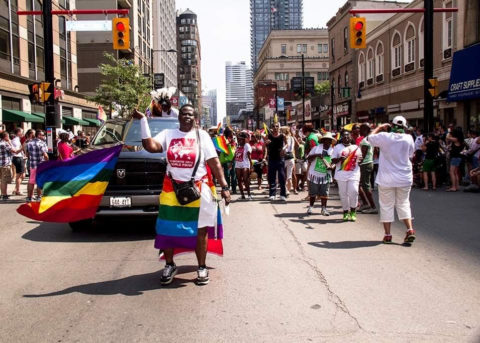
“I wanted to bring an aspect of my Trinbagonian culture to Dyke March with ‘Women’s Health in Women’s Hands’ participation by choosing to be the ‘flagwoman’ in front of the music truck. That was a crowning moment for me, but even more so, the audacity to wear my country’s flag on my waist draped as a skirt. I was making a personal statement that I am marching for the many LGBTQ persons at home who could not march to celebrate their pride in Trinidad and Tobago at that time.”
Aemilius Milo, artist and social entrepreneur
“Does every baby queer dream of falling in love at Pride? It was 2016, our community at large was reeling from the Pulse Orlando tragedy, as a latinx queer, being close to my people was necessary. My mourning heart broken open, I met my twin flame, had our first kiss in front of Wellesley station post-Trans March with Lila Downs singing in concert for the latinx stage. Hearts healed and dreams came true that night.”
Andrew Gurza, disability awareness consultant
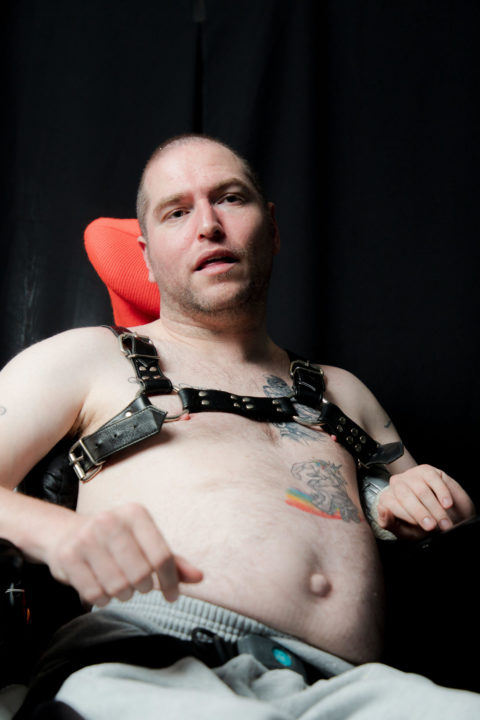
“I remember when I marched with my friend Scott Jones at Pride 2018 in Toronto. Both of us are wheelchair users and it was so incredible to show that disabled people have a place at Pride, even though all the bars are inaccessible and the attitudes of people around disability in the LGBTQ2S community are incredibly ignorant, this was a moment that I could be immensely proud of. I could say, ‘I belong here.’”
Patricia, bar manager of Buddies in Bad Times
“One year, about 10 years ago, I was bartending at Buddies with Glenn Dwyer early on the final evening of Pride. We had gone through the month of June, shit-show busy, and we were exhausted and I was like, ‘Fuck Pride, it’s exhausting.’ The year before that, I had a bottle thrown at me and it hit me in the head resulting in a fist fight between myself and the bottle thrower. I was down on Pride. Glenn looked at me while we were doing a shot and said, ‘Pride isn’t for us Patricia. It’s for those who don’t have pride everyday.’ Later, two men in their seventies came to the bar and said they were from Texas. As they were holding hands, they burst into tears and said ‘thank you.’ Those men and Glenn changed so much for me. Pride is more than what we see and more than we can understand.”
leZlie lee kam, queer dyke community activist
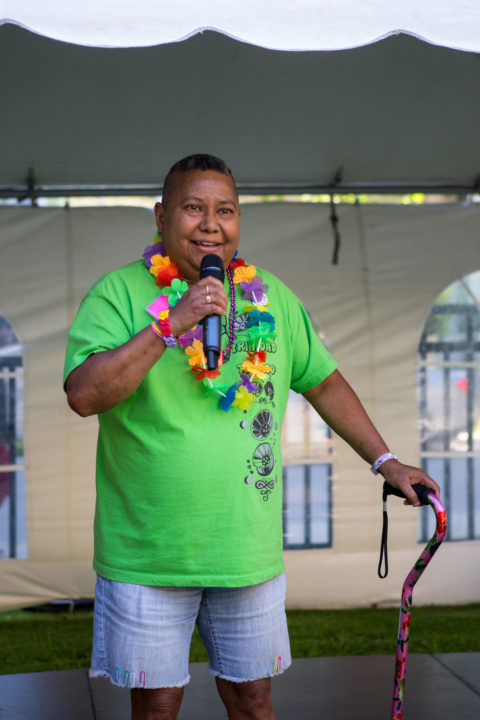
“Rage! Rant! Resist! That is my memory of Pride. In 1999, World Majority Lesbians participated in the Toronto pride parade, with ‘Queer Womyn Colouring The Century – Celebrating Pride, Love, Strength.’ Our sign ‘Stop Police Racism: End The Criminalization of People of Colour’’ — we struck a huge blow for JUSTICE! Now, I am a queer DYKE senior sitting on the board of Pride Toronto, celebrating 40 years of RESISTANCE and PROTEST! My EXISTENCE is my RESISTANCE!!”
Twysted Miyake-Mugler, artist and community organizer, co-founder of Toronto Kiki Ballroom Alliance
“My first memory from Pride would have to go back to 16 years old. Still nervous to be seen in the community during the daylight hours, I bit the bullet and walked up Mutual Street. At every intersection, I would look to Church Street to see the people, hear the music, and feel the pull of community, but was too nervous to actually step out. By the next year, I was with my friends on Church Street sitting on the stairs in front of the houses across from Timothys coffee.”
Deborah Cox, Grammy-nominated singer, actress and Broadway star
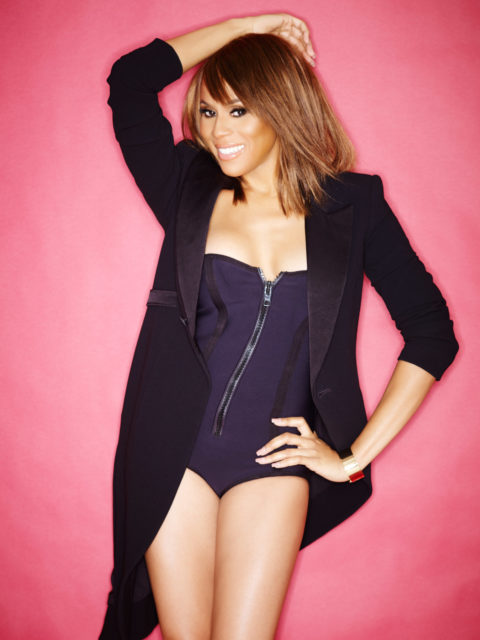
“Performing at the opening ceremony of WorldPride 2014 Toronto was an unforgettable experience. To be able to celebrate the history, courage, and future of the LGBTQ2S+ community alongside so many brave activists was extremely special. The passion for change that ran through the entire festival was palpable, and I was honoured to join them in celebrating their groundbreaking accomplishments in my hometown. It’s definitely a performance that sticks out as being incredibly memorable and inspiring.”
Ravyn Ariah Wngz, art-ivist, abolitionist, and orator; co-founder of Black Lives Matter Canada, ILL NANA/DCDC
“Pride 2017 changed my life by revealing a truth I had kept in the back of my mind not fully wanting to admit because it was too painful. Black trans women were forgotten, unsafe, and disappeared into the corners of the LGBTQ+ community when we are the cornerstone of this queer and trans rights movement. I took my place at the front of the Black Lives Matter Toronto March to remind everyone of who started this, and to show that the work was not done. In black veils and smoke bombs and in silence we showed our strength, resilience, grief, pride, and purpose. My hope is that everyone finds the truth in their Pride.”
Keith Cole, performance artist and political activist

“Pride 2009 stands out because of meeting two divas, backstage, for a brief meet and greet, and meeting one diva for a drink on the Zelda’s patio (sadly now gone). I met Ultra Naté backstage after her incredible performance and she signed my CD, then I met Kelly Rowland after her performance, too. Having a drink with Deborah Cox on the Zelda’s patio that year, she signed my One Wish CD, which I still have today (‘To Keith, With Love, Deborah’). Pride weekend 2009 was during a heatwave — see photo of me sweating it out. It rained on the day of the parade, but cleared up eventually. Michael Jackson died that last week in June 2009, that brought many people down. Also, if you remember QuAIA (Queers Against Israeli Apartheid) was a HUGE presence and brought much anger, confusion and division in the LGBT+ community, the City of Toronto and the media.”
Tim McCaskell, activist, author, self-proclaimed “gay dinosaur”
“I knew the world had changed [during] one pride in the mid-nineties, when, wandering through Church Street packed with revellers, I saw a hunky, shirtless daddy. Not our kind of daddy. A real one, wife and two kids in tow. Once, he would have nervously clutched her, signalling he wasn’t one, in the wrong place, desperate for an exit. That day, oblivious to admiring glances, just another nonchalant tourist. We’d killed gay panic.”
Lauren Strapagiel, senior reporter BuzzFeedNews
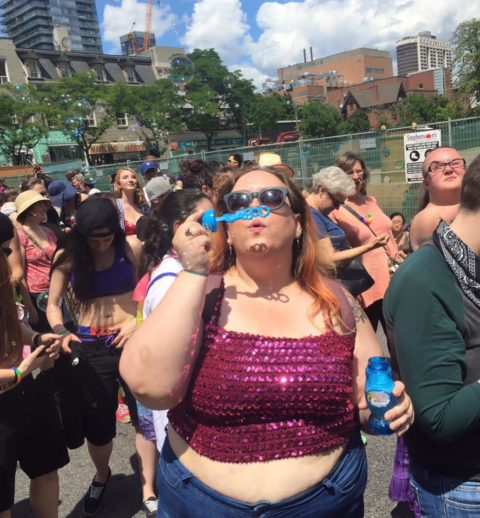
“The 2016 Dyke March was everything. I was out, but it was the first time I felt brave enough to join the march instead of just watching from the sidewalk. I wore a pink sequin crop top, blew bubbles, and got a really weird sunburn from all the glitter smeared on my skin. It’s not my most salacious Pride memory, but it is the most joyful.”
Tynomi Banks, drag performer and Canada’s Drag Race cast member
“One of my favourite memories of Pride was a few years ago at Starry Night, a fundraiser for The 519. It was the first time I put other drag performers in my show. People assume queens are mean to each other and don’t show support. It was a great memory because it showed the community that we work together and actually get along (and we looked amazing while doing it). We were there for a good cause and it was not about anyone’s ego.”
Tyler J. Sloane, multidisciplinary artist, facilitator and producer
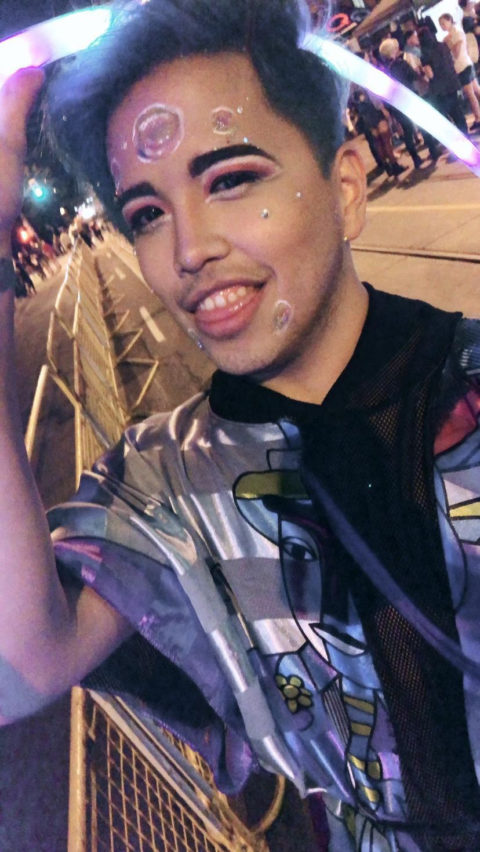
“June 22nd, 2018. Trans coloured make-up, with painted on bubbles. Violently blue hair, a shimmer cool-toned Picasso print caftan. An LED hula hoop. It was the first Trans March I marched as my femme self. ‘Fuck our hearts!’ My best friend and I declaring ourselves the ‘Gender-Reveal Twins’ as a mockery to gender-reveal parties. My former boyfriend proclaimed his love for me on the Buddies stage. A piano rendition of ‘A Million Reasons’ by Gaga.”
Syrus Marcus Ware, activist and artist
“One of my favourite memories was Blocko 2006, Deep Dickollective about to go on stage, Trey Anthony hosting, d’bi Young had just performed, and Michelle Ross got on stage and broke down this incredible afrobeat track and whipped her wig off, her peach dress flowing everywhere as she spun around in joy and power!”
Angel Imbeault, PFLAG parent
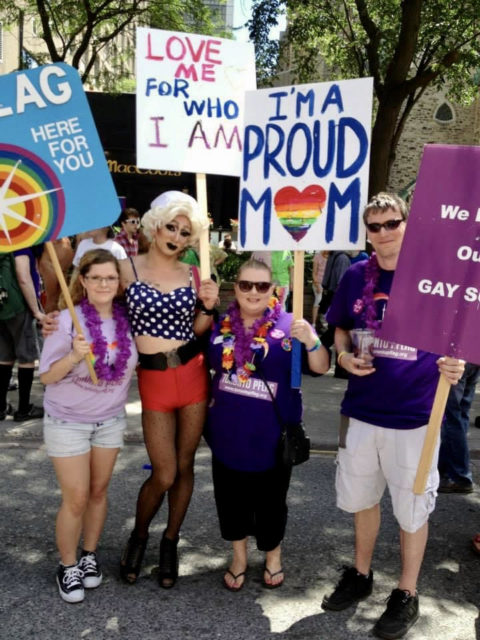
“My name is Angel a.k.a. Mama BoBo. My family has been attending Toronto Pride every year since moving here in 2008, often proudly walking with PFLAG. My favourite Pride memory is from 2013. Usually my child Scarlett BoBo is performing, hosting or on a float, but that year they were able to walk with us. I will never forget turning the corner onto Yonge with Scarlett at my side and thousands of people cheering. The amount of appreciation for the PFLAG group makes me proud but also breaks my heart, because it reminds me that so many don’t have supportive parents.”
Enza Anderson, 2SLGBTQ activist, former supermodel
“The Pride kiss that has been forever archived on the front page of the Toronto Sun. June 1998, launch of Pride Week at Toronto City Hall, official rainbow flag raising ceremony. Making his Pride debut, newly amalgamated City of Toronto mayor, Mayor Mel Lastman. Boasting he was a Pride virgin, he hoisted the flag. I witness his people leave his side, get alongside the man for a photo-op, photographers scrambling, think fast, girl! Red juicy lips smacked on his left cheek! Pride virgin, no longer.”
Nikki King/Nicolette Brown, trans woman/drag performer (she/her)
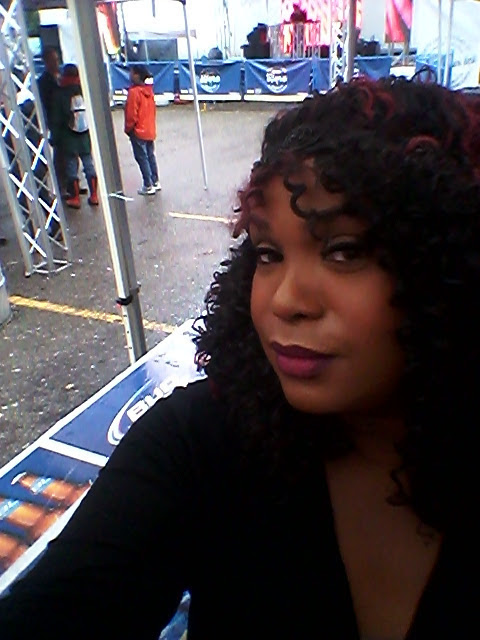
“Pride weekend 2015. It was a rainy and cold weekend. Usually Pride weekend is sunny, warm, and full of people all over Church Street celebrating. Even though it wasn’t busy and the weather didn’t cooperate, it was still a memorable Pride. I was able to spend Pride with my friends, also the unlimited free drinks didn’t hurt! Happy Pride!”
JP Larocque, TV writer and journalist
“A few years ago, my partner and I got into an Uber, heading to the Village. We were in our leather gear and both a bit nervous, as we have experienced homophobic ride shares. But after a few quiet moments in the car, the driver complimented our outfits and revealed himself to be a queer elder — he’d come to Canada from the Caribbean in the early ’70s and had faced discrimination within the gay community as queer Black man. It was this moment of connection as we shared stories back and forth about life in the community past and present, and laughed and laughed — one of those oh-so-rare moments of queer connective lineage that had an impact on both of us. That is definitely my best Pride memory.”
Jaime Woo, activist, mindfulness educator, author of Meet Grindr
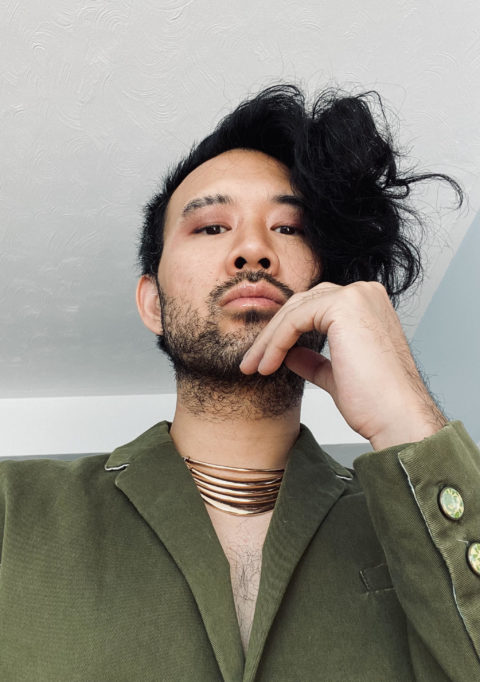
“In 2018, after nearly two decades attending Toronto Pride, I danced on a float for the first time, supporting LGBT Youth Line. I marvelled at my journey from an unsure but hopeful youth to the resilient and loving person of today. I didn’t dance because I was good at it, or sexy, or liked attention — instead, I needed to hold space in a culture that routinely trivializes people of Asian descent. I moved to the crowd’s cheers, and it was glorious.”
Francisco Ibáñez-Carrasco, HIV activist and assistant professor, Learning Innovations, Dalla Lana School of Public Health, University of Toronto
“By the time I came to Toronto in 2009, Pride was already an oversized, commercialized event and being pulled politically in many directions. I feel peripheral to its business but not less queer. I put out pride everyday, being openly gay and poz; professionally working on writing, research, and teaching that openly delves into, and propagates, queerness of all colours, shapes, allegiances, and sizes. When Pride comes, I recede into a closet.”
Crystal Chandelier, of the Etobicoke Chandeliers, drag performer
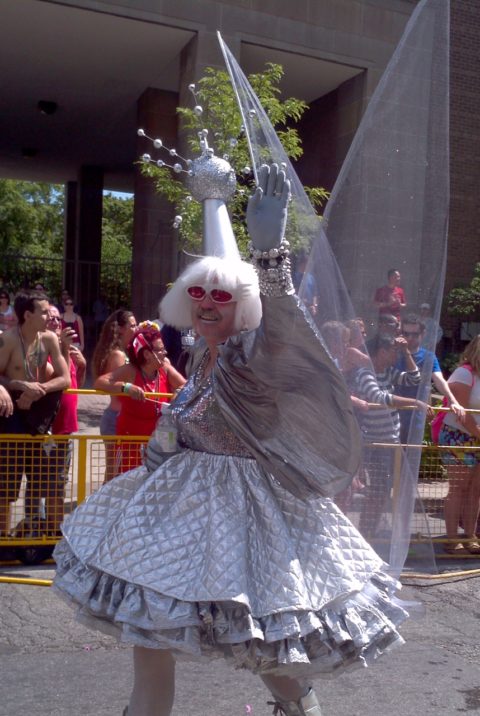
“I was wearing silver with a satellite on my head and 8” heel, 4” platform shoes. It was hot. I was just getting to the parade muster area when my platforms melted. I slid down a leather man in chaps. DRAG QUEEN DOWN!! I got up, he handed me my lipstick and off we went. Not a word.”
Sonali (Alyy) Patel, activist, scholar and founder of Queer South Asian Women’s Network
“In 2020, I was the first South Asian speaker at Pride Toronto’s Dyke March. This wasn’t a personal achievement — it was a tremendous win for my community. As queer South Asian women, we are severely underrepresented in LGBTQ discourses — especially in lesbian spaces. Speaking at Pride carved out visibility in a space where we’ve always been invisible. It was truly an honour to speak in front a crowd of queer folks, whom I never thought would understand nor respect my co-existing queer South Asian identities, while wearing my sari and adorned in traditional Gujarati jewellery. This was a breakthrough moment for queer South Asian women’s visibility in Toronto’s LGBTQ+ community — and hopefully not the last. Pride Mubarak and Pride Vaalthukkal!”
Sica Saccone, poet, Lavender curator and Flamingo Market co-founder
“My favourite memory is my first time going to Pride — sneaking onto a Greyhound bus from Niagara with a friend to get to Toronto, ending up at Slacks, dancing with strangers and celebrating my newfound love and acceptance of my queerness until 4 a.m. last call. Then having a shawarma picnic on a closed off Church Street with my new pals.”
Elvira Kurt, comedian, writer, teacup butch extraordinaire
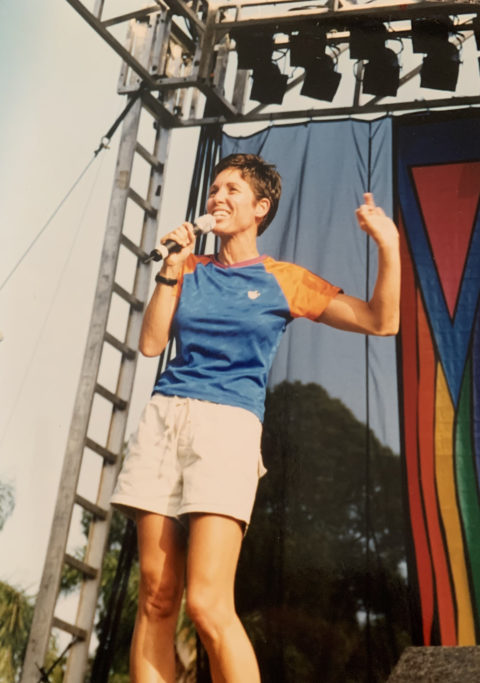
“1992. To be at Gay Pride Day — doing comedy! On stage! As a lesbian! — it was everything. Midday? Sure! Outdoors? Why not! Squeezed in front of the band set up? Perfect! Until I get there and it’s just me before this giant empty parking lot. How do I…? And then, I’m on. Get busy! I did. At some point, I realized the city sounds, the traffic noises, were gone, blocked out now by laughter, applause, cheering. I locked in on what had become this amazing rainbow sea of gay faces… and soared. Looking back now, I can see that the ‘more’ I was after, the ‘all’ I’d been wanting was here, in this moment, in the middle of Church Street, with my people. This homo found home. And that, is everything.”
Alex Newman, advertising creative director and co-author of All Out: A Father and Son Confront the Hard Truths That Made Them Better Men
“I took my dad to Woody’s. Softcore porn on the TVs, he clutched his beer while acclimatizing. To my amazement, he got comfortable quickly. Chatting with my mates, then others in the community and before I knew it, I had lost him in the crowd. Reflecting on the evening it dawned on us — we had a family union. My paternal family had met my LGBTQ family and they had hit it off.”
The B-Girlz, drag troupe
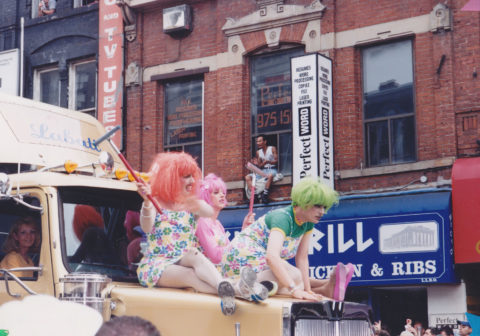
“Pride 1998. Church Street was open to traffic Friday night so we decided to squeegee cars for charity. We drew a huge crowd so on Pride Sunday we decided to crash the Parade and unofficially squeegee the floats. Next thing you know, we were on the front hood of a giant Labatt truck and just stayed there! We had the best ‘trucking’ time but sadly there was no free beer…. or a sponsorship deal.”
Brad Fraser, writer and director
Excerpted with permission from All the Rage: A Partial Memoir in Two Acts and a Prologue: “Whatever its deficiencies, [the film] Parade captures the gay village of Church and Wellesley and the gay Pride celebrations at their nineties peak [in 1995]. At that time there were no barriers between the crowds and the parade participants. As those barriers went up a few years later, so did the corporate sponsorships. And the gelding and homogenization of what had started as a protest and a demand for recognition.”
Dean Odorico, Woody’s general manager

“Pride has grown and changed so much in 40 years. I’ve worked in queer establishments during all of them. Working Pride can be exhausting and overwhelming. It’s easy to forget about the importance of Pride over the years. But every year I can watch it through the eyes of someone from a small town or another country where it’s not okay to be different. That always brings me back to my first Pride, and how important it was, as I realized everything was okay and I was glad to be gay. My favourite memory of Prides gone by was when all the local bars created floats for the Pride Parade, and seeing and hearing the reaction and roar from the crowds lining the streets.”
Hollywood Jade, choreographer and artistic director
“My Pride memory would be the first time I performed for Blockorama with Michelle Ross for DJ Blackcatt. Blocko at the time was still at the back of the Wellesley parking lot. I was barely legal and had never seen so many queer Black people in my life. My entrance to the Black gay community was through the hands of two legends. RIP Michelle Ross.”
Kiley May, actor, artist, activist, and author
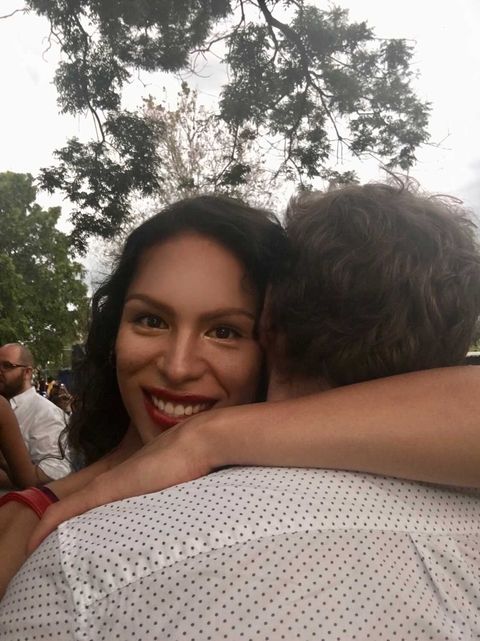
“In 2017 my boyfriend Lorne walked with me in the Trans March. He’s an older cis-het man who’d never dated a trans woman, and we’d only been dating a year. I never thought he’d be open to it, but he surprised me when he asked to join me. That day showed me that he loved me publicly and was proud to be with me. It meant a lot. We’ve now been together for five years.”
Regina Gently, DJ, musician and performer
“I was a regular DJ at Buddies in Bad Times for several years and their Pride parties were always these mammoth affairs, consistently packed. I was on stage in the main room with several hundred kids living their best Pride lives. Part of the gig is playing the tracks for the drag show which is like the main event. I was set up centre stage and the queens would perform right in front of my gear. I start the track, run off stage, the show starts. No problem I thought, as long as they don’t bump my gear or shake the stage too much, you know, hope for the best. Katinka Kuture was being her fabulous showgirl self as the headliner and host. At the climax of her song, as she jumps up and lands straight into the splits, her full weight pounding down onto that stage, the music, stops. And so did my heart. The drop did something that cut the music for a few seconds, which of course felt like a minute, miraculously it was on beat, and then just like that as I rushed out to see if I could fix it, it came back on. A happy accident perhaps? Was her pussy just that hot? The number ended with uproarious cheers.”
Clare “Flare” Smyth
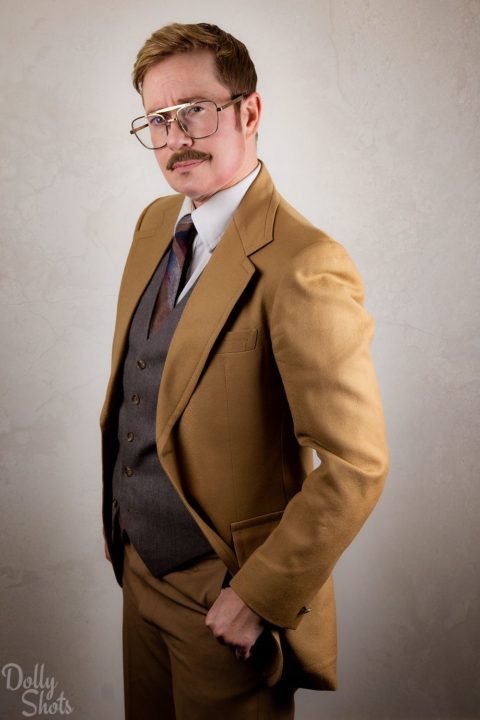
“There is nothing like walking down the street as a drag king. Or taking a cab. Or buying something at a convenience store. Or ordering a drink from a bar. It’s surreal in its illusion. People part ways. People give items for free. You are served first. In the mirror reflection is the reality. I’m not a white man. I’m a butch lesbian. No one gets out of my way and normally I pay extra. I am a social crime until I put that moustache on. Then I’m King.”
Billy Newton-Davis, singer-songwriter, four-time Juno Award winner
“Pride has always been my ‘Christmas’! The fab party that ends on post-Pride Monday… around noon. Love the entire celebration — my culture and all of the people.”
DJ Blackcatt, legendary DJ, promoter, curator and member of the House of Monroe
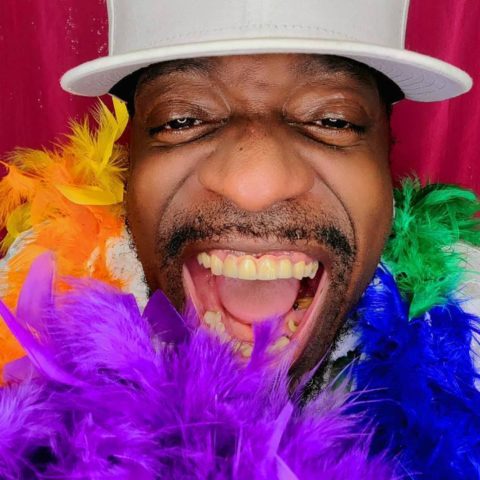
“Blockorama is always the event I look forward to and remember. I played Blocko from the first year. I literally see certain people only once a year at Blocko. The year I got to be the headliner (closing DJ) was the year I remember the most. Not only did I close with my favourite kind of music, house, Jamaica Pride was in the audience that year and invited me to DJ for Pride in Jamaica. It was a great experience.”
Chelle Turingan, managing producer of video at Xtra and co-director of Small Town Pride
“My very first Pride was in Toronto in 1999. I’d just graduated from high school, I was dating my first girlfriend, and I played a chic little 20-minute acoustic guitar set on one of the smaller stages on Church Street. It was Sunday afternoon, just before the big parade on Yonge Street was starting, so there were still a lot of people milling about in the Village. My last song was a cover of Nine Inch Nails’ ‘Closer’ and when I got off the stage, a gaggle of rowdy gay men cheered for me. After attending Prides for over 20 years, that one is still one of my favourites.”
Adamo Ruggiero, digital producer
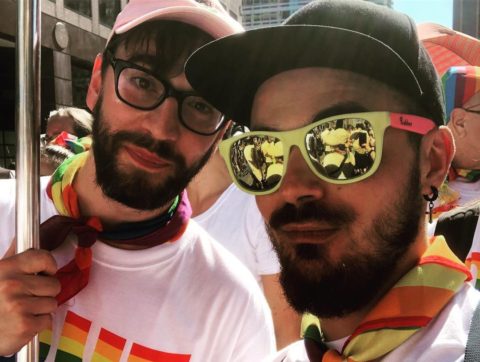
“Our last Pride before the pandemic, I walked in the parade for the first time. I brought my number one ally since high school. It was hot and crowded and I was anxious and took a hit of someone’s vape just to settle my nerves. And then there was my ally carrying a giant flagpole with the Pride flag and a big, reassuring smile. It was a snapshot of why I survived, then thrived. And so we walked. Thank you allies.”






